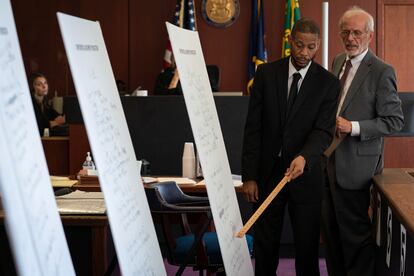Jury decides newer Aretha Franklin will found in her couch after death is a valid document
It’s a victory for Kecalf Franklin and Edward Franklin whose lawyers had argued that papers dated 2014 should override a 2010 will that was discovered around the same time

A document handwritten by singer Aretha Franklin and found in her couch after her 2018 death is a valid Michigan will, a jury said Tuesday, a critical turn in a dispute that has turned her sons against each other.
It’s a victory for Kecalf Franklin and Edward Franklin whose lawyers had argued that papers dated 2014 should override a 2010 will that was discovered around the same time in a locked cabinet at the Queen of Soul’s home in suburban Detroit.
Aretha Franklin did not leave behind a formal, typewritten will when she died five years ago at age 76. But both documents, with scribbles and hard-to-decipher passages, suddenly emerged in 2019 when a niece scoured the home for records.
Franklin’s estate managers have been paying bills, settling millions in tax debts and generating income through music royalties and other intellectual property. The will dispute, however, has been unfinished business.
There are differences between the 2010 and 2014 versions, though they both appear to indicate that Franklin’s four sons would share income from music and copyrights.
But under the 2014 will, Kecalf Franklin and grandchildren would get his mother’s main home in Bloomfield Hills, which was valued at $1.1 million when she died but is worth much more today.
The older will said Kecalf, 53, and Edward Franklin, 64, “must take business classes and get a certificate or a degree” to benefit from the estate. That provision is not in the 2014 version.
Ted White II, who played guitar with Aretha Franklin, testified against the 2014 will, saying his mother typically would get important documents done “conventionally and legally” and with assistance from an attorney.
Franklin was a global star for decades, known especially for hits like Think, I Say a Little Prayer and Respect.
Sign up for our weekly newsletter to get more English-language news coverage from EL PAÍS USA Edition
Tu suscripción se está usando en otro dispositivo
¿Quieres añadir otro usuario a tu suscripción?
Si continúas leyendo en este dispositivo, no se podrá leer en el otro.
FlechaTu suscripción se está usando en otro dispositivo y solo puedes acceder a EL PAÍS desde un dispositivo a la vez.
Si quieres compartir tu cuenta, cambia tu suscripción a la modalidad Premium, así podrás añadir otro usuario. Cada uno accederá con su propia cuenta de email, lo que os permitirá personalizar vuestra experiencia en EL PAÍS.
¿Tienes una suscripción de empresa? Accede aquí para contratar más cuentas.
En el caso de no saber quién está usando tu cuenta, te recomendamos cambiar tu contraseña aquí.
Si decides continuar compartiendo tu cuenta, este mensaje se mostrará en tu dispositivo y en el de la otra persona que está usando tu cuenta de forma indefinida, afectando a tu experiencia de lectura. Puedes consultar aquí los términos y condiciones de la suscripción digital.








































